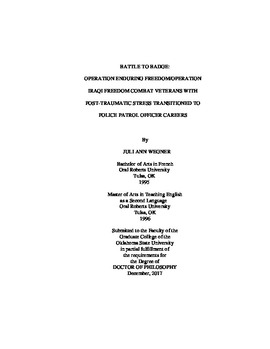| dc.contributor.advisor | Romans, John | |
| dc.contributor.author | Wegner, Juli Ann | |
| dc.date.accessioned | 2018-06-18T16:02:27Z | |
| dc.date.available | 2018-06-18T16:02:27Z | |
| dc.date.issued | 2017-12 | |
| dc.identifier.uri | https://hdl.handle.net/11244/300078 | |
| dc.description.abstract | Operation Enduring Freedom/Operation Iraqi Freedom (OEF/OIF) warriors served on the battlefield in an era and contexts that set them apart from combat veterans of previous wars. Some notable factors are advanced battlefield medicine leading to greater numbers of survivors carrying grave physical and mental effects; multiple successive deployments with little or no physical or mental recovery time; and intense stressors unique to wars in countries where indigenous civilians, police, and armies are enlisted to help U.S. general troops and Special Forces. | |
| dc.description.abstract | Combat mental trauma from physical injury, killing others, or watching co-warriors die and ongoing risk of violent death can lead to Post-Traumatic Stress. Veterans entering law enforcement with that diagnosis embody this complex dynamic. Historical setting aspects including terrorism-response wars render present-day troops a unique demographic. A qualitative study to mine the compounded facets of these officers focused on experiences of twelve male interviewees. Methods for this qualitative, phenomenological dissertation research included recorded in-person interviews, verbatim transcription, and analyzing and synthesizing data for themes. | |
| dc.description.abstract | Results and conclusions carry the concepts: military and police cultures, highly masculine, discourage help-seeking; veterans bond with co-combatants, fellow officers, and non-extremist Iraqis and Afghanis; and seek to protect these nationals as well as American civilians once back home. Veterans applying intensive military training and combat strengths to law enforcement could benefit jurisdictions more than they may be applying; beyond firearm expertise and maintaining calmness under fire they effectively differentiate threatening targets from innocent civilians. Current conversation of police use of force including shooting of suspects should acknowledge veterans as a resource; re-forged combat skills, utilizing this sharp judgement expertise, is an asset needed by our public. | |
| dc.format | application/pdf | |
| dc.language | en_US | |
| dc.rights | Copyright is held by the author who has granted the Oklahoma State University Library the non-exclusive right to share this material in its institutional repository. Contact Digital Library Services at lib-dls@okstate.edu or 405-744-9161 for the permission policy on the use, reproduction or distribution of this material. | |
| dc.title | Battle to badge: Operation Enduring Freedom/Operation Iraqi Freedom combat veterans with Post-Traumatic Stress transitioned to police patrol officer careers | |
| dc.contributor.committeeMember | Ausburn, Lynna | |
| dc.contributor.committeeMember | Carlozzi, Al | |
| dc.contributor.committeeMember | Koch, Julie | |
| osu.filename | Wegner_okstate_0664D_15515.pdf | |
| osu.accesstype | Open Access | |
| dc.type.genre | Dissertation | |
| dc.type.material | Text | |
| thesis.degree.discipline | Education | |
| thesis.degree.grantor | Oklahoma State University | |
